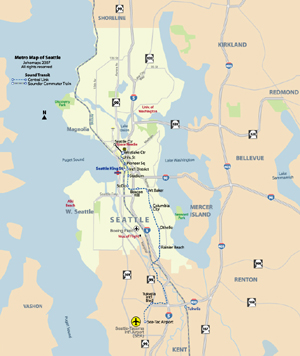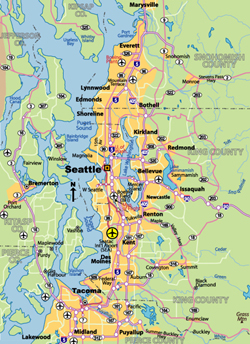Other names of Seattle:
Queen City, Jet city (nicknames)
Adjective: Seattleite
Seattle
(From Wikipedia)
Copyright owned by wikipedia.org
See
here for copyright and licensing conditions
Seattle is
the largest city in the Pacific Northwest region of the United States.
It is located in the U.S. state of Washington between Puget Sound and
Lake Washington, nearly 108 miles (174 km) south of the United
States–Canadian border in King County, of which it is the county seat.
Seattle was founded in the 1850s and named
after Chief Seattle, or Sealth. As of 2005, the city had an estimated
population of 573,000 and a metropolitan population of around 3.8
million. Seattle is the hub for the Greater Puget Sound region. Its
official nickname is the "Emerald City" (because of the lush
evergreen trees in the surrounding area), and it is also referred to as
the "Rainy City", the "Gateway to Alaska",
"Queen City", "The City of Goodwill", and "Jet
City" (the last due to the heavy influence of Boeing). Seattle is
known as the birthplace of grunge music, and it has a reputation for
heavy coffee consumption because of the many coffee companies that were
founded there, including Starbucks and Tully's Coffee. Seattle was also
the site of the 1999 meeting of the World Trade Organization and
anti-globalization demonstrations. Seattle residents are known as Seattleites.
Researchers at Central Connecticut State University ranked Seattle the
most literate city in America for 2005.
Based on per capita income, one of the more
reliable measures of affluence, Seattle ranks 36th of 522 ranked areas
in the state of Washington.
History
Most of the Denny Party, the most prominent of
the area's early Caucasian settlers, arrived at Alki Point on November
13, 1851. They relocated their settlement to Elliott Bay in April 1852.
The first plats for the Town of Seattle were filed on May 23, 1853. The
city was incorporated in 1869, after having existed as an incorporated
town from 1865 to 1867.
Seattle was named after Noah Sealth, chief of
the Duwamish and Suquamish tribes, better known as Chief Seattle. David
Swinson ("Doc") Maynard, one of the city founders, was the
primary advocate for naming the city after Chief Seattle. Previously,
the city had been known as Duwamps (or Duwumps)—a variation of that
name is preserved in the name of Seattle's Duwamish River.
Major events in Seattle's history include the
Great Seattle Fire of 1889, which destroyed the central business
district (but took no lives); the Alaska-Yukon-Pacific Exposition of
1909, which is largely responsible for the current layout of the
University of Washington campus; the Seattle General Strike of 1919, the
first general strike in the country; the 1962 Century 21 Exposition, a
World's Fair; the 1990 Goodwill Games; and the WTO Meeting of 1999,
marked by street protests and a police riot.
On February 28, 2001, a state of emergency was
declared after the Nisqually Earthquake, a magnitude 6.8 earthquake,
rocked the region. Damage was moderate, but served as a reminder that
the coastal Pacific Northwest ?and the area around the Seattle Fault,
in particular ?is under a constant threat of earthquakes
Seattle has a history of boom and bust, or at
least boom and quiescence. Seattle has almost been sent into permanent
decline by the aftermaths of its worst periods as a company town, but
has typically used those periods to successfully rebuild infrastructure.
The first such boom, covering the early years
of the city, was fueled by the lumber industry (it was during this
period that Yesler Way was nicknamed "Skid Road" after the
timber skidding down the street to Henry Yesler's sawmill. The term
later entered the wider American vocabulary as "Skid Row"),
followed by the construction of an Olmsted-designed park system.
Arguably the Klondike Gold Rush constituted a separate, shorter boom
during the last years of the 19th century, funding Nordstrom's initial
growth.
Next came the shipbuilding boom in the early
part of the 20th century, followed by the unused city development plan
of Virgil Bogue. After World War II the local economy was marked by the
expansion of Boeing, fueled by the growth of the commercial aviation
industry. When this particular cycle went into a major downturn in the
late 1960s and early 1970s, many left the area to look for work
elsewhere, and two local real estate agents put up a billboard reading,
"Will the last person leaving Seattle ?Turn out the
lights."
Seattle remained the corporate headquarters of
Boeing until 2001, when the company announced a desire to separate its
headquarters from its major production facilities. Following a bidding
war in which several cities offered huge tax breaks, Boeing moved its
corporate headquarters to Chicago, Illinois. The Seattle area is still
home to Boeing's Renton narrowbody plant (where the 707, 720, 727, and
757 were assembled, and the 737 is assembled today), and Everett
widebody plant (where the 747, 767, and 777 are assembled, and the
upcoming 787 Dreamliner will be assembled); and BECU, formerly the
Boeing Employees Credit Union.
The most recent boom centered around Microsoft
and other software, Internet, and telecommunications companies, such as
Amazon.com, RealNetworks, McCaw Communications (later acquired by
AT&T and renamed AT&T Wireless), and VoiceStream (later acquired
by Deutsche Telekom and renamed T-Mobile USA). Even locally
headquartered Starbucks held investments in numerous Internet and
software interests. Although some of these companies remain relatively
strong, the frenzied boom years had ended by early 2001.
[Read
full article] |

